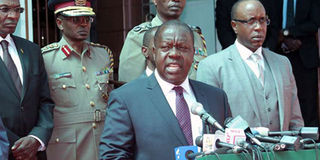Public support, not law, is the best protection for press freedom

Interior Cabinet Secretary Fred Matiang’i, flanked by other senior government officials, gives a press conference at Harambee House, Nairobi, on January 31, 2018. The government shutdown three media houses over the 'swearing-in' of Raila Odinga. PHOTO | DENNIS ONSONGO | NATION MEDIA GROUP
What you need to know:
- Article 34 forbids the State from exercising control over or interfering with any person engaged in broadcasting.
- Mr Kaikai, who was on Wednesday apparently threatened with arrest, has received support from fellow journalists and rights crusaders.
I can think of only one rational reason why Kenya Editors Guild chairman Linus Kaikai went public on a meeting he did not attend: To forestall what he perceived to be a threat.
On Monday, a day before the swearing-in of Raila Odinga as “President”, he issued a press release stating that last Friday, President Uhuru Kenyatta summoned media heads and threatened to revoke their licences if they broadcast the ceremony live.
Unfortunately, Mr Kaikai’s statement turned out to be controversial.
His vice-chairman, Mr Samuel Maina, and publisher Hannington Gaya said there were no such threats issued.
The two, who attended the State House meeting, said it was only pointed out that the freedom of the media comes with responsibility, such as one would exercise in covering terrorism.
PRESS FREEDOM
Back to Mr Kaikai’s pre-emptive announcement.
In war, the idea of aggressive prevention, or pre-emptive strike, has appealed to generals since the Spartans went to war against Athenians in the struggle for Ancient Greece.
Even in our society, individuals who anticipate danger tend to act pre-emptively to counter threats, such as when a politician announces, “My life is in danger; I’ve been threatened…” when he perceives danger.
Similarly, Mr Kaikai, who is also the general manager of NTV, took anticipatory action to defend press freedom.
Unfortunately, again, the preventive war doctrine did not work.
It may even have made things worse.
The three television channels -- NTV, Citizen TV, Inooro TV, and KTN News -- were shut down for allegedly covering the 'swearing-in' live.
LAW
The stations were switched off shortly after 10am despite Article 34 of the Constitution, which guarantees the freedom and independence of electronic media.
The article forbids the State from exercising control over or interfering with any person engaged in broadcasting.
The State may not penalise any person for the content of a broadcast.
However, broadcasting stations are subject to licensing to regulate the airwaves, the Constitution states.
Still, that must be independent of control by government, political, or commercial interests.
But Article 33 says the right to freedom of expression does not extend to propaganda for war, incitement to violence, hate speech; or advocacy of hatred that constitutes ethnic incitement, vilification of others or incitement to cause harm.
SECURITY
In his Wednesday press conference, Interior Cabinet Secretary Fred Matiang’i said the stations were shut because thy defied what he called a prior full security brief.
He said the stations chose to disregard security advice, their own code of ethics, self-regulation, and the moral responsibility of every Kenyan to safeguard the security of their fellow citizens.
Dr Matiang’i has since said it was a “smart decision” that prevented a “bloodbath”.
Mr Kaikai, who was on Wednesday apparently threatened with arrest, has received support from fellow journalists and rights crusaders.
But, from all appearances, he deserves more from members of the public whose right to information he was defending. Public apathy is dangerous.
I find parallels in the shutdown to what happened in Turkey on October 2016.
PROPAGANDA
Police raided the IMC TV headquarters and cut a live broadcast on Tuesday, October 4, in the aftermath of the July 15 failed coup.
According to media reports, employees gathered behind the news anchor’s desk and shouted “free media won’t be silenced” as technicians sent by the authorities cut the wires and screens went blank.
IMC TV has not been opened since. It was silenced for “spreading terror propaganda” and being a “threat to national security”.
So were 11 other television stations. The public outcry was not loud enough to deter the government.
The shutting down of the media in Turkey and Kenya shows that laws guaranteeing freedom are not enough to deter a government determined to suppress the media.
The lesson is that media need public support to survive, which it must not take for granted.
It must cultivate the support, for the best protector of press freedom is the public.
Send your complaints to [email protected]. Text or call 0721 989 264.




